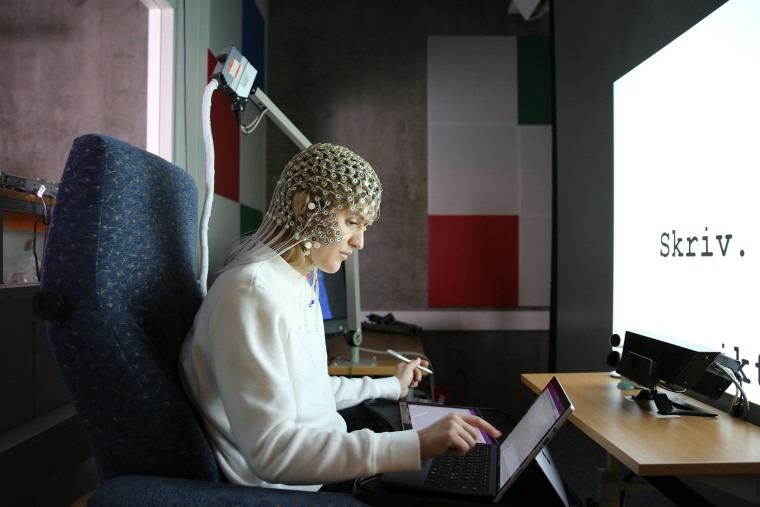Writing by hand may increase brain connectivity more than typing, readings of student brains suggest
After recording the brain activity of university students, researchers in Norway determined that writing by hand may improve learning and memory.

Typing may be faster than writing by hand, but it’s less stimulating for the brain, according to research published Friday in the journal Frontiers in Psychology.
After recording the brain activity of 36 university students, researchers at the Norwegian University of Science and Technology determined that handwriting might improve learning and memory.
At the start of the experiment, the students were told to either write words in cursive using a digital pen on a touchscreen, or to type the same words using a keyboard. When a word such as “forest” or “hedgehog” appeared on a screen in front of them, they had 25 seconds to write or type it over and over.
Meanwhile, a cap of sensors on their head measured their brain waves. The cap’s 256 electrodes attached to the scalp and recorded the electrical signals of the students’ brains, including where brain cells were active and how parts of the brain communicated with each other.
“Our main finding was that handwriting activates almost the whole brain as compared to typewriting, which hardly activates the brain as such. The brain is not challenged very much when it’s pressing keys on a keyboard as opposed to when it’s forming those letters by hand,” said Audrey van der Meer, the study’s co-author and a neuropsychology professor at NTNU.
In particular, the study found that writing by hand required communication between the brain’s visual, sensory and motor cortices. People who wrote with the digital pen had to visualize letters, then use their fine motor skills to control their movement when writing.
“When you have to form letters by hand, an ‘A’ will look completely different than a ‘B’ and requires a completely different movement pattern,” van der Meer said.
By contrast, when typing, the keys look mostly the same, regardless of the letter. As a result, the study found, typing required less brain activity in the visual and motor cortices.
“Because only small parts of the brain are active during typewriting, there is no need for the brain to communicate between different areas,” van der Meer said.
Van der Meer’s previous research in children and young adults similarly found that people’s brains are more active while writing by hand than while typing. A 2017 study from Indiana University also indicated that writing by hand could link visual and motor skills, which might help kids better recognize letters.
But so far, there’s mixed evidence as to whether taking notes on paper versus a laptop can help people remember and understand information better in the classroom or raise their performance on tests.
It’s
also hard to know whether or how the brain activity in the new study
might translate into real-life improvements in learning or memory, said
Ramesh Balasubramaniam, a neuroscientist at the University of
California, Merced, who wasn’t involved in the research.
Source: https://www.nbcnews.com/health/health-news/writing-by-hand-may-increase-brain-connectivity-rcna135880 (DoA: 31/01/2024)








